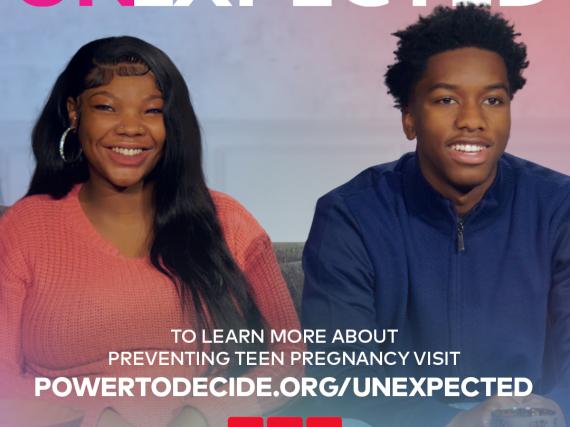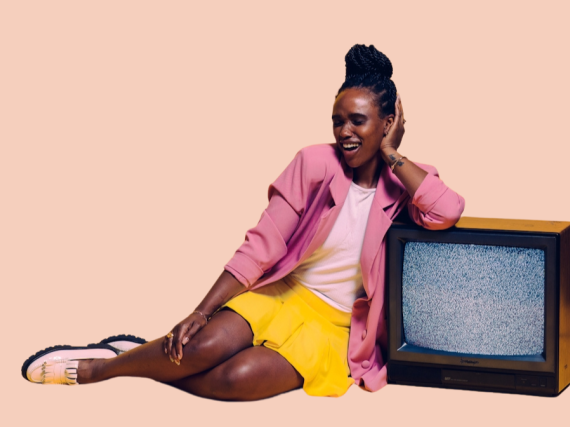5 Groundbreaking Shows that Continue to Inspire Us
With summer—and more opportunities to socialize—approaching, it’s more important than ever to use the time that you have with the young people in your life to talk about sex, love, and relationships. Research shows that young people want to hear from their parents and other adults in their lives about these topics and how to navigate it all.
Not sure how to begin? Relating to TV shows and movies that cover some of the more “uncomfortable” topics can be a great place to start the conversation! Seven in 10 young people have learned something useful about sex, love, or relationships from what they're seeing onscreen. And while it's common for themes about sex to be discussed openly and directly in the media now, that wasn’t always the case. Shows like the WB’s Dawson’s Creek walked so that hits like Netflix's Sex Education could run.
So, in celebration of #TalkingIsPower and our 25th Anniversary, we gathered five groundbreaking blasts from the past 25 years that grabbed headlines when they launched, are still favorites today, and helped drive historic declines in teen and unplanned pregnancy. Long-time viewers and a new generation of fans are showing how much of a lasting impact onscreen stories can play in the lives of young people. Hear about why these shows were so groundbreaking from Marisa Nightingale, Power to Decide’s former Senior Director of Entertainment Media, and why they are still so impactful from Cat McKay, our Digital Coordinator.
Degrassi: The Next Generation (TeenNick):
Why it was groundbreaking: Since its debut in 1979, Degrassi and its many iterations has dealt directly and openly with every type of issue that real teenagers face, including and especially sexuality, sex, and pregnancy. This show broke the “after-school special” mold, weaving in humor, sadness, and nuance. TeenNick not only invited us to support storytelling, they also “roadblocked” entire days in May to support Teen Pregnancy Prevention Month (the precursor to #TalkingIsPower month), airing Degrassi episodes that dealt with sex and unplanned pregnancy, surrounding the programming blocks with our teen-created PSAs, and publishing online content including interviews with cast members. The show built on its tight-knit relationship with its fans and was always coming up with creative ways for viewers to dig deeper on what characters were going through. One of the most memorable story lines we helped inform was when Liberty and JT deal with an unplanned pregnancy. We see the way their dynamic changes and both characters grow as a result. Plus, this is where Drake got his start!
Why it matters now: Most of my summers were spent awaiting the next late-night Degrassi marathon on TeenNick. I like to say that Degrassi is one of those high schools where every situation imaginable has happened—and for good reason. Because the show follows the same core group of young people throughout the ten seasons, the audience watches the characters grow up and mature through challenges. And from the beginning, Degrassi was never afraid to cover the topics that teens want to hear about: sex, love, relationships, and how to navigate it all. While there are actually hundreds of episodes and characters in the Degrassi world, Next Generation is a fan favorite that can be streamed Amazon Prime Video.
Gilmore Girls (The WB)
Why it was groundbreaking: Gilmore Girls was one of the first shows that grew out of the development fund of the Family-Friendly Programming Forum, which set out to create TV series and films that would have cross-generational appeal while earning critical success and have high entertainment value. The co-head of the network—and our board member, media advisor, and Hollywood champion Susanne Daniels—greenlit the show and made The WB the epicenter of smart girl storytelling. Gilmore Girls is one of Time Magazine’s 100 greatest television shows of all time. Lorelai and teen daughter Rory Gilmore traded wisdom and support for each other, with Lorelai’s life-changing experience as a teen mother at the heart of their unique bond and as the premise of the series. We worked closely with executives at The WB (later The CW) to provide everything from tips and messages about talking openly about sex and insights on what audiences were thinking and saying about teen and unplanned pregnancy. The non-preachy nature of the show and the vulnerability of both mom and daughter were hallmarks of the show at the time and gave it lasting appeal.
Why it matters now: Compared to some of the other shows on our list, the love story at the center of Gilmore Girls is between Lorelai and Rory—a refreshing change of pace. With over 150 episodes, the show was a steady reassurance that love, loyalty, and lasting friendship can be found in a small town like Stars Hollow. Lorelai and Rory talk about everything, including sex and relationships, and you get to watch both mother and daughter grow over the course of 7 years. Gilmore Girls was one of the only shows that covered topics such as sex without using guilt or fearmongering and had all of their characters (Rory, Lane, Paris, Lorelai and Emily) make different choices about sex and relationships while still portraying them as strong, intelligent, and independent women. Gilmore Girls had such lasting popularity that Netflix even produced a revival miniseries set nine years after the original finale called Gilmore Girls: A Year in the Life! You also can stream all seven original seasons on Netflix.
The Secret Life of the American Teenager (Freeform/ABC Family):
Why it was groundbreaking: Secret Life made waves when it premiered in 2008 because its entire premise was focused on Amy, age 15, who gets pregnant the first time she has sex, and the many ways that her experiences as a pregnant and parenting teen affect her family, friendships, and love life. The show debuted a year before the premiere of 16 and Pregnant and aired on ABC Family (now Freeform), which was a newly edgy direction for the network. Since the whole series revolved around a pregnant and parenting teen, we had the opportunity to collaborate with the creatives on multi-dimensional storytelling about teen pregnancy—beyond a single arc, episode, or point of view. The show mixed all the elements of a soapy teen drama—betrayal, sex, heartbreak, family conflict—with tons of open conversations about sex, love, relationships, and pregnancy. One of my favorites was when sexually experienced Ricky (the father of Amy’s baby) shares one of our messages with Ben (Amy’s boyfriend), “Everyone’s not having sex. Some are, some aren’t, and some are lying about it.” We loved that the show teenage boys having a real conversation about sex. The series was groundbreaking for us too: in addition to supporting storylines, the network invited us to write PSA scripts for the show’s cast and aired them at the end of every single episode. This gave viewers a safe and evidence-based way to learn more and gave their parents and champions assurance that the show wasn’t just using teen pregnancy as a plot device. The pilot episode broke the record for the highest rated debut on ABC Family with nearly 3 million viewers. This show served as a model for how a TV show could mix entertainment and education with success on both fronts. Plus, Gen X-ers like me loved that Molly Ringwald played Amy’s mom!
Why it matters now: The only reason I was allowed to watch Secret Life as a middle-schooler was due to the Power to Decide-produced PSAs at the end, encouraging the young people tuning in to openly talk about sex with their parents. Secret Life was the first show I watched week-to-week where teenagers proudly discussed topics such as sex, birth control, masturbation, and more. And these episodes inevitably opened up the conversation with my parents, who were always lurking around the corner. Even though the show can get cheesy, Amy’s words from the original PSA still ring true today:
“The first time too many teens have the sex talk with their parents is when they’re telling them that they’re pregnant. Parents, if your teens have a question about sex, don’t assume they’re doing it! And teens, if your parents aren’t talking to you about sex, don’t assume they don’t care... Start talking.”
You can dive back in to Secret Life directly on Freeform’s site for free and on Hulu with a subscription.
Gossip Girl (The CW)
Why it was groundbreaking: When Gossip Girl premiered on The CW in 2007, the network and producers made it clear that this show would push past what audiences typically expected from a high school series. By setting it in New York, they were able to portray high schoolers who were especially precocious—with an expectation that they were sexually active, experienced, and had the maturity of a bunch of 20-somethings. At the time, most high school shows treated sex as a “wait for later” topic; in Gossip Girl, we were able to cover more with our network partners about birth control, pregnancy scares, power dynamics related to sex, and more. We worked closely with the show’s amazing creator and producer Stephanie Savage, the show’s creator and executive producer, who was—and is—personally dedicated to telling sex-positive stories and making sure that young people are informed about all their birth control options. We previously worked together on The O.C., so we had a trusted relationship and ongoing communication. The CW experimented with a fully realized digital Gossip Girl universe, giving the show’s devoted fans a way to extend their relationship with the show. They brought us along in so many creative ways! One milestone: the CW’s digital team placed one of our tank tops in Gossip Girl’s virtual bedroom; when viewers clicked on it, they could purchase the top and learn about sex and birth control, while still feeling connected to the world of the show.
Why it matters now: To say that I am obsessed with the show Gossip Girl is an understatement. I’ve seen every episode at least ten times and have a framed signed picture of Blair in my bedroom. Even though the characters’ outrageously expensive lifestyles aren't super relatable, their drama is rooted in the typical highs and lows of love and friendships. Serena and Blair were the original frenemies, but their hearts ultimately lead them back to each other and to their true loves. I’ve also noticed throughout my re-watching that Blair is a feminist, sex-positive queen! Not only does she own her desires and sexuality, but Queen B also knows that romantic love does not define her success. You can stream Gossip Girl on its new home, HBO Max. And watch out for the reboot, due to come out later this year!
Jane the Virgin (The CW)
Why it was groundbreaking: The genius of Jane the Virgin was that it lived in fantasy and reality at the same time, all the time. The executive producer, Jennie Urman, is incredibly dedicated to telling stories about strong women and a life-long champion of reproductive rights. Despite the show’s unrealistic premise, the creators weaved in some of the most realistic and nuanced stories about figuring out pregnancy, sex, and parenthood on your own terms. The fact that the series was based on a Telenovela and its majority Latinx cast set it apart before it even aired; but its handling of sex, sexuality, pregnancy, and parenthood broke the mold. In season one, when Abuela assures Jane mid-breakdown that she’s stronger than she thinks and can handle being a single mother; or when three generations of women talk openly and positively about choosing abortion, we see the full spectrum of what having the power to decide really means and how much these women strengthen each other.
Why it matters now: I didn’t start watching Jane the Virgin until quarantine, and I loved every second of it! Despite the improbable premise, Jane is forced to make a lot of very realistic decisions when it comes to taking care of her son, Mateo. Throughout the fantastical drama of the show, Jane’s focus is making the best choices for her son’s future. Even though it’s not how most (or any) unplanned pregnancies happen, Jane’s story highlights the experience of becoming a parent when you least expect it. Figuring out how to navigate life with a blended family is a concern for a lot of families, and the fantastical nature of Jane the Virgin exemplifies that those situations can work out. Plus, the show is an indisputably important representation of Latina culture and the telenovela style in American media. Catch up on all five seasons now on Netflix.



